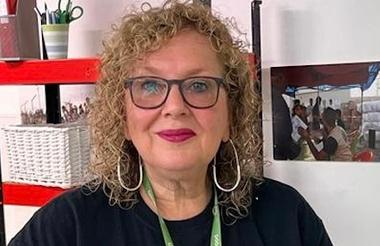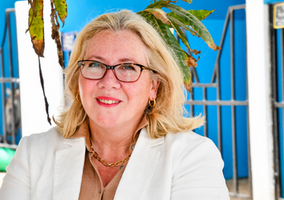One day in 2014, after being made redundant from World Jewish Relief (WJR), Rosalind Bluestone was sitting at her dining room table, considering what she could do to address global poverty.
At WJR, Bluestone had been responsible for the delivery of a humanitarian aid programme, which then closed, aimed at communities in eastern Europe and former Soviet Union countries.
“I had the privilege of working for a London-based international charity for 12 years, travelling to Ukraine, Moldova, Belarus, Serbia, Romania and Poland. Seeing how people lived in abject poverty really shocked me.
“It was a huge eye-opener for me to realise how people didn’t have nappies or sanitary pads, sharing clothes for children to go to school or sharing boots to go out in the snow.”
She “felt too young to be made redundant”, but had acquired knowledge and expertise at WJR alongside connections with UK corporates. Bluestone decided to found her own charity.
“I was very keen to find a way to carry it on, although I didn’t have a warehouse, a truck or men who could load a truck. So, I started from scratch and worked for three and a half years by myself setting up Goods for Good.”
Nearly nine years on, her charity has delivered almost £41m worth of humanitarian aid from overstocked goods to millions of people across 26 countries that might have otherwise ended up in landfill.
‘Huge volunteering workforce’
Goods for Good’s income has increased by more than 250% since 2017, from £97,080 to £346,241 last year, according to accounts filed with the Charity Commission.
Bluestone says the charity has “worked hard on the fundraising side of things” and that the most recent increase in income can be partly attributed to the war in Ukraine and the generosity of people.
“Suddenly money started coming in without us even doing any big marketing campaigns and we were able to respond really quickly.”
The charity has hundreds of volunteers and several corporate volunteers, such as DUNE and Uniqlo, and works with over 100 other charities. However, it only has a handful of staff.
“I know [what we do] sounds very impactful but we’re a tiny team; there are four of us doing this,” Bluestone says.
Instead, the charity relies on its “huge volunteering workforce”.
Since the pandemic began, Goods for Good has pivoted its operation to help more people in need in the UK. This is because an unprecedented number of local charities turned to the organisation for help as the individuals they serve were experiencing financial hardship.
“Covid-19 happened overnight, where suddenly the NHS needed nappies and hygiene goods, and we had quite a substantial stock in our facility. So, we started to move that stock and people were also donating,” says Bluestone.
“It was quite overwhelming the number of people who came forward to volunteer during Covid-19. We were working with 12 organisations pre Covid-19 that were mostly asylum seekers, refugee centres, drop-in centres and also with the homeless and then suddenly it started to increase and became 14, 16, 20, etc.”
The impact of Brexit
Goods for Good works closely with Dutch charity and logistics partner Humanitarian Resources International Foundation (HRIF), which handles and delivers some of the donated goods via a warehouse in the Netherlands. Bluestone says her charity is now sending more donated goods directly to recipients, especially since Russia’s invasion of Ukraine last year.
Brexit also posed some challenges for the charity, which was “treading water for about three or four months,” she says.
“We tried to send as much over to Holland as possible before Brexit because there’s no get-out of jail card for charities, no loophole to get through.”
Luckily, HRIF set up an export system, which involves a UK third-party operator that handles complex paperwork and logistics. The service costs Goods for Good about £150 per shipment.
Despite this, Bluestone says “it’s worth every penny”.
“The fact that we’re sending goods directly now to places like Poland, obviously they have to have the right documentation and transit papers in place,” she adds.
“Some countries like Moldova, you actually have to send in your manifest and the weights and measures prior to sending the goods. So, if we didn’t have commercial partners doing that weighing and measuring and getting those manifests together, we wouldn’t be able to do what we do.”
Another issue facing Goods for Good is the rise in the cost of petrol, which in turn has pushed the transport companies the charity works with to increase their costs.
Bluestone estimates that before the increases it cost the charity £3,500 to send something to Europe. Now, prices have increased by around 20% in some cases.
‘Our facilities are too small’
In May last year, the charity announced a humanitarian partnership scheme to attract more corporate organisations, businesses and individuals to continue delivering its work.
The charity previously estimated that it needs £400,000 a year to run its operation and achieve its objectives. “For this investment, we can deliver at least £8m worth of goods and aid,” it said.
For Bluestone, strategic partnerships between the charity and business sectors are key to helping vulnerable individuals and communities in the UK and around the world and driving change.
“We’re trying to plan a sustainable future, but our facilities are too small. The premises we’re in aren’t really fit for purpose and we can’t afford to bring in a proper team. We want to be set up so that when there is an emergency, we’re ready to go.
“We’ve had an avalanche of goods come in from retail companies wanting to help with the Turkish and Syrian earthquakes. The reality is that goods have come in such a great quantity that we haven’t got enough money to ship them.”
At the moment, Bluestone says that around six companies have signed up for the scheme. Her ambition is to have at least 20 that would each give the charity £6,000 a year and be part of what it does.
“The charity sector is fatigued so we’re trying to think outside of the box.”
She says that charities and businesses should form more partnerships together. “I think it’s the future. What we’ve created is a unique platform, where community and corporate come together. If a company has the ethos of human kindness, it’s better than advertising.”
Related articles













